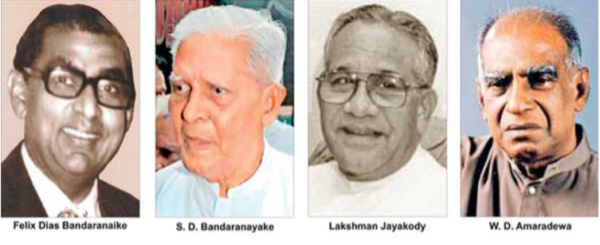
Source:Island
(Excerpted from the Memoirs of Senior DIG (Retd.) Edward Gunawardena)
With a month to go for my confirmation as an ASP, Police Headquarters thought it fit to assign me to the important police district of Gampaha. Western Province North was the SP’s Division. The office of the Supdt. of Police Western Province North was located in Gampaha. The other ASP’s districts in the Division were Peliyagoda and Negombo. The ASP Peliyagoda was T. Thalayasingham and K.V. Ramanathan was the ASP Negombo. The DIG in charge of the WP North Division was C.C. Dissanayake, DIG Range I.
The Gampaha Police district had six police stations at the time. The officers in charge were Tharmarajah, HQI Gampaha, SI P. Vedamuthu, OIC Weliweriya, SI Percy Wijesuriya, OIC Kirindiwela, IP Hamid, OIC Veyangoda, IP Alex Abeysekera, OIC Nittambuwa and IP Michael Schokman, OIC Mirigama.
Mrs. Sirima Bandaranaike was the Prime Minister and Horagolla Walawwa was located in the Nittambuwa Police Station area. This country residence of the PM was not even guarded by the police then. She did not want the field police to be hanging round at Horagolla. Whenever she visited the mansion, her security division headed by ASP Rajasooriya managed without taxing the local police. She had immense faith in her two bodyguards, IP Chandrasekera and SI Wewala. However, I did not fail to realize that the security of Horagolla was my prime responsibility. Apart from the Prime Minister, every state guest visited Horagolla, some even over nighting there.
The other politicians that mattered were the MPs with their electorates, or part of them, in the Gampaha police district. They were all cultured, honourable gentlemen with whom I could empathize with ease. There were no Provincial Councilors or Pradeshiya Sabha members at that time – the tinpot political scum of today. In that respect the sixties were wonderful years. At that time MPs had high respect for public servants; they got on excellently with each other with mutual respect for one another.
Of the MPs representing Gampaha at the time, the majority are no more. S.D. Bandaranayake and Lakshman Jayakody (LJ) are the only two living as I write this account today. The former was the MP for Gampaha and latter was the MP for Divulapitiya. The other parliamentarians were: Felix Dias Bandaranaike ( Dompe – Kirindiwela police area), Wijayabahu Wijesinghe (Mirigama), S. K. Sooriarachchi (Mahara – Weliweriya Police area) and M.P. de Z. Siriwardena (Minuwangoda). There was also JP Obeysekera (Attanagalla).
The friendly experiences I had with some of these MPs are worth recalling. The first of them I met was J.P. Obeysekera. After I had received my transfer order to Gampaha, one day I dropped in at the Fountain Cafe for lunch. I was in uniform. My father, who was the Asst. Manager there, sat at the same table and was chatting to me. Most of the senior waiters dressed in immaculate white were round my table chatting. Some of them had even carried me as a child. I still remember the names of a few of them – Cornelis with a ‘konde’ and a crescent turtle shell comb, Alphonso, Ambrose, Bhatia and Kitta. The last was the waiter who brought our meals from Fountain Cafe to St. Joseph’s College during the war years. Martin and Simon the cooks also joined the group.
As I was finishing my lunch a lean, tall man dressed in white slacks and white long sleeved shirt walked in smiling. My father greeted him warmly and guided him to a table. After he was seated, father introduced me to him. Only when I got talking to him that he realized that I was to be the new police chief of the district; and it was only then that I came to know the MP for Attanagalle. JPO was a gentleman to his finger tips. After the initial meeting at Fountain Cafe, I seldom met him. He belonged to the cream of the low-country aristocracy, was well endowed with wealth and had graduated from Cambridge. He became a friend of mine but did not want the police by his side to boost his ego. What a contrast to the politicians of later years!
After I left the Gampaha District on transfer I had the opportunity of meeting him on several occasions. Long after my retirement from the police, I wrote a novel ‘Blood and Cyanide’ published in 2001 when I was a Director of Lake House. On reading the reviews of this novel in the newspapers, JPO telephoned to congratulate me. I felt guilty about not having invited him to the book launch at the Sri Lanka Foundation Institute and I sent him a copy. He reciprocated by sending me his book on his solo flight to Ceylon from Britain after he completed his studies at Cambridge.
As I write these memoirs today S.D. Bandaranayake is alive and one of his sons, Pandu, is an MP. Before I went to Gampaha I had heard much about SD, more as a troublesome character who did not like the police very much. As he was the MP for the electorate of Gampaha I decided to make contact and took the initiative by telephoning him on a Saturday morning. He was surprised. “This is the first time a police officer has contacted me and wanted to call on me. Mr. Gunawardena, you are most welcome. My wife and I will be delighted to have you for a little dinner with us this evening”. I kept the appointment. It was quite a sumptuous dinner considering the austere times, preceded by vodka, caviar and a lively conversation. SD had many contacts in the Russian Embassy. Hence the repast!
A few days later, the Gampaha police raided an illicit liquor den in Yakkala. SD telephoned me and told me that the man under arrest was known to him and that he was not a kasippu dealer or seller. In spite of protests by the HQI Gampaha, the suspect was released by me. However, I told SD that there was good evidence against the man. Emboldened by the leniency shown by the Police this man recommenced his trade and I decided to lead a raid. It was successful. Several bottles were seized. Other than the seller, three others who were consuming illicit liquor were also arrested.
All these people together with the productions were bundled into a Land Rover and driven straight to Madugas Walawwa, SD’s residence. He was on the verandah. When I told him what happened, he was most embarrassed. He angrily walked up to the Land Rover, got his friend to alight, gave him two thundering slaps and told him to stop this business forthwith. The gentleman he was, SD did not hold this against me.
Lakshman Jayakody (LJ) was a well to do proprietary coconut planter and a full blooded Trinitian. A large part of his electorate fell within the Mirigama Police area of which the OIC was Michael Schokman. Jayakody and Schokman had both played cricket for Trinity, the latter the senior of the two. They got on very well and as a result the ASP Gampaha had very few problems from the Mirigama Police area!
Lakshman J being a descendant of John de Silva was a lover of the Tower Hall Sinhala Music. He himself was fond of singing these famous old songs. One day in 1961 he invited me to a musical evening with an exclusive audience, mainly from the diplomatic corps. It was held at the Tower Hall and lasted for about three hours. Some of the singers were H.W. Rupasinghe, Eddie Master, Allen Ratnayake, A.M.U. Raj, Latiff Bhai and G.S.B. Rani. The only instruments were the tabla, serapina (harmonium) and the violin. The violinist was W.D. Albert Perera who later changed his name to W.D. Amaradeva.
Lakshman Jayakody and I have remained friends ever since. In the 70s when I was the Director Planning and Research and P.A. to the IGP, I had occasion to work with him closely particularly during the JVP uprising of 1971. When two Cessna light aircraft were acquired by the SLAF at that time, it was he and I who travelled in the inaugural flight to Palaly. Apart from Palaly, where we were entertained to lunch by Col. Bull Weeratunga, we visited the Karainagar Naval base which was in charge of Commander Neville Andrado. Lakshman J. was the Junior Minister of Defence at that time.
Felix Dias Bandaranaike was a friendly sort when I first met him in 1961. He was the MP for Dompe and the Kirindiwela police station came within the Gampaha police district with SI Percy Wijesuriya in charge. Whenever FDB visited his electorate he functioned from the Weke Walawwa which was in the Kirindiwela police area. I still remember the day he wanted me to stay for lunch with him. He had got the caretaker to prepare his favourites, jak curry and a dry fish bedun which I too enjoyed. A heavy smoker, FDB smoked a pipe and cigarettes. At the end of the meal, he was looking for a cigarette as he had finished all he had brought. Accepting a Bristol cigarette from me he joked, “no harm sharking a punt from a Peradeniya junior.” Perhaps the Peradeniya connection helped us to get on well.
With FDB’s meteoric rise to dizzy heights in the political firmament, lesser mortals like me quite naturally faded away from his reckoning. However, I consider it my good fortune to have known him well even fleetingly. He indeed has a unique place in Sri Lanka’s history. It was he by his courageous and decisive conduct that saved the nation when democracy was in peril in 1962 and 1971.
Wijebahu Wijesinghe and S.K.K. Sooriarachchi were also easy to get on with. The former once visited the United States on an official visit with fellow MPs Wijepala Mendis and I.A. Cader. As they were to visit Texas A and M, I made arrangements for them to stay with my brother, Irwin, who was doing his Master’s degree there.
M.P. de Z Siriwardena, the MP for Minuwangoda was the Deputy Minister of Labour. Very much unlike the other MPs of the Gampaha district, he was abrasive in his ways and often rubbed the police on the wrong side. I soon realized that he was a man who could easily be outwitted. His main support group in the electorate was the large scale illicit distillers and he was determined to protect them from police action. He even encouraged them to resist and obstruct police raids.
Once a police party from Gampaha led by IP Buhary was obstructed. Buhary, acting in self defence, had used a police baton on a violent thug. This man had died of head injuries and a magisterial inquiry was in progress. One morning when I was in the HQI’s office M.P. de Z S walked in with a few others saying, “I say ASP, your people have killed my man.” I told him to sit down and requested the HQI to send for the Information Book. I calmly told the MP that as he appeared to know something about the death, that he is at liberty to make a statement. He got cold feet and left saying that he did not want to make a statement. Politicians are big talkers but discreetly avoid situations that make them witnesses in court cases. They shun cross-examination.
I remember, not long after, a strong supporter of the MP made a complaint against the police of assault. The complaint, made to the SP Jayakody, alleged that an Inspector had even spoken disparagingly of the MP. As my SP showed interest in this complaint, I fixed an early date for the preliminary inquiry in my office and notified the witnesses. Two days before the inquiry this MP had telephoned the SP and told him that the inquiry should be held in a school at Asgiriya. I told the SP that in that case it will take the form of a public inquiry. “Gune, do whatever you want”, was his response.
I told HQI Tharmarajah to arrange a school and fixed the date for the inquiry. I also told him that at the request of the MP this will be a public inquiry and told him to arrange for a few people to come forward and volunteer evidence favourable to the police. Tharmarajah, the seasoned policeman, was amazed at the suggestion. After recording the statements of the formal witnesses I announced that any person who wished to give evidence could do so. Three out of many who came forward were selected. Their evidence (well coached by the police) was most convincing. My SP had no alternative but to agree with my findings. M.P. de Z S certainly went through a learning exercise. Distraught and defeated he had told my SP, “your ASP is a hard nut.”
Funeral of Singho Mahattaya alias Wickramarachchi of Attanagalla
One morning IP Alex Abeysekera, the OIC Nittambuwa telephoned me that Singho Mahattaya of Attanagalle had died; and the Governor -General and Prime Minister were due to pay their respects at his residence. I had never heard of Singho Mahattaya and told the Nittambuwa OIC to have some police presence at the residence and also along the route. On second thoughts I asked Tharmarajah the HQI Gampaha about the deceased. He told me that it was this man, who was rich and influential, who had always been the proposer of the name of S.W.R.D. Bandaranaike at elections.
After the discussion I had with Tharmarajah I decided to visit the sprawling residence of Singho Mahattaya at Maligatenne. OIC Nittambuwa was there and he introduced me to Singho Mahattaya’s two sons, Nagasiri and Kithsiri who warmly received me. Prime Minister Sirima Bandaranaike had already visited the funeral house once with her children and was expected to visit again. Nagasiri and Kithsiri were awaiting the arrival of Sir Oliver Goonatilleke, the Governor-General. When he arrived in his Austin Princess I saluted him and received him. I was the most senior public official present.
Having introduced the two sons, I accompanied him into the house and remained close to him. Soon I realized that he was comfortable with me by his side. Before leaving the funeral house the G.G. whispered to me that he would like to visit the Bandaranaike Samadhi that was being constructed at the time. I conveyed this information to the HQI and went ahead of Sir Oliver, having instructed the pilot officer to stop behind my car that will be parked on the road opposite the Samadhi site.
Although my intention was to take him to the site by car, he preferred to walk. The G.G. was received at the site by the most senior officer of the Public Works Dept. who was present, Peter Jayawardena. Peter explained the difficulties to meet the completion target of September 26, 1961. Sir Oliver saw for himself how the work was going on day and night. There were several temporary tea kiosks that had come up on the roadside to cater to the workers. He walked with me to all these places and told the boutique keepers that they should unfailingly supply the workforce with their requirements. Before getting into his car he told me to get these kades to supply whatever the workers want and send the bill to Queen’s House! A tall order indeed from a man who had even been the country’s Auditor-General. I passed this information to Peter Jayawardena. That’s all I could have done.
During my meeting with Sir Oliver at this funeral he even addressed me as ‘Sonny’. Showing great interest, he asked me about crime in the area and troublesome characters. He asked me about the MPs and the relations I maintained with them, specially asking me whether they interfere in my work. He was also keen to know about the popularity of each of them in their respective electorates. The significance of this conversation with Sir Oliver dawned on me only after the attempted coup d’etat which took place a few months later.
Singho Mahattaya had been a great admirer of SWRD Bandaranaike. Because SWRD had gray hounds, he (Singho Mahattaya) had also thought of bringing up dogs. He had imported a pair of Great Danes and named them Barnes and Barney. Barnes Ratwatte was the father of Sirimavo! Nagasiri, the elder son of SM who became very friendly with me, gifted me with a full grown Great Dane that had shown affection to me whenever I visited him. However, after about eight months I had to put him down because he became fierce and even growled at me. Nagasiri was a great friend indeed. Whenever I visited him he treated me with the best of food and drink. He died young. I remember attending his funeral at Attanagalle with Stanley Senanayake, the IGP, who also had known Singho Mahattaya and his family.






